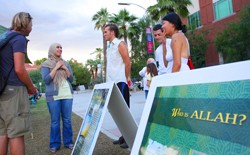Saturday evening, the smell of roasting chicken kabobs wafted down the length of the UA Mall, as Muslim friends and family got together to celebrate the spirit of the holy month of Ramadan.
Jamal Nadeem, a senior studying molecular and cellular biology and president of the Leaders of Tomorrow, a program that trains Muslim youth strong leadership skills, walked around busily instructing newcomers where to go.
“”It’s kind of an experience,”” Nadeem said. “”You get to have some fun, get to run a few things and you get to help someone. What more could you ask for?””
The Leaders of Tomorrow hosted the occasion not only to mark Ramadan, an upcoming time of fasting where Muslims do not eat until sunset or after sunrise for an entire month, but also to support refugees living in the Tucson area.
At a table adorned with red and yellow balloons, volunteers for the Noor Women’s Association handed out educational flyers, and showed their appreciation for ticket purchases, all of which counted toward donations.
“”It’s for a good cause,”” said Safa Merheb, a Lebanese woman who has volunteered with Noor for about four years. “”Those refugees that are coming do not know anything, they need help, they need guidance, they need a lot of things – so we try and help them as much as we can.””
According to data from the U.N. High Commission for Refugees, which serves as a starting point for those seeking asylum in times of warfare and sectarian violence, almost 2.1 million Iraqis have fled their country.
Although some are eventually allowed to come to the U.S., many are forced to leave their homes first, to reside most often in camps among the five neighboring countries, threatening to overcrowd other economies and strain their resources.
Noor is one organization that helps refugees transition into American society, raising over $200,000 in charity over the past eight years to provide things like sheets, soap and pillows that aren’t covered by food stamps to refugees not only from Iraq, but all over the world.
Sarah Dehaybi, a recent UA graduate, first-year medical student and member of the Leaders of Tomorrow, said she knew firsthand of their struggle after having volunteered with a refugee family from Lebanon.
“”It’s hard to imagine leaving everything you know, everyone you love, to who-knows-what is going to happen, and you go somewhere where you’re seen as a burden on the economy,”” Dehaybi said. “”It’s hard, and I feel like these people are very hardworking and people are kind of difficult on them – but they don’t know the language, the culture, and don’t know the education system.””
The altruistic aspects of the celebration were timely, members said, and the fact that they were donating the money to refugees was in line with the essence of Ramadan.
“”It’s not only about fasting, it’s like kind of purifying yourself, concentrating on yourself and how dependent we are on God and on each other,”” Dehaybi said. “”It’s very much about giving back to people and you feeling hunger with people, feeling pain.””
At many of the group’s events, as well as those of the Muslim Student’s Association, outreach is always a key component. And as Nameed noted, signs standing on the edge of the mall that posed questions about Islamic values and beliefs were meant to combat misinformation about Muslims.
“”It’s not a bunch of people on camels, and its not a bunch of people blowing themselves up,”” Nameed said. “”That’s not what Islam is – and it’s very diverse.””
Mohammad Alabagi, a UA senior majoring in physiology, said he remembered one instance in which he was met with a lack of information from others.
“”I was in a class where they thought that we abuse women, that that’s part of our religion,”” Alabagi said. “”And it’s quite the contrary, my dad has not ever laid a finger on my mom.””
In Jeannette Greeney’s experience as a Noor volunteer for over four years and a non-Muslim woman, she said she was often met with some of these misconceptions that she finds overplayed in the media.
“”I get questions now about the fact I work with primarily Muslim people, they say, ‘well aren’t you afraid?'”” Greeney said. “”I get many questions that would indicate that it’s dangerous, I mean, there’s terrible things going on around and on the Internet.””
Dehaybi, the former president of MSA, said education continues to be very important to both MSA and the Leaders of Tomorrow, as Muslims are a minority and are often misunderstood in America.
“”A lot of the time there’s not accessible knowledge, you know, the Internet is a 50-50 chance you’re gonna get something real or something crazy,”” Dehaybi said. “”I think it’s important for us to do events like this in very public places so people can see kind of a different side.””
Celebrating the holy month, and opening it to non-Muslims as well as Muslims, she said, reinforces what Ramadan is all about.
“”It’s important to donate our money, our time, and our efforts,”” Dehaybi said. “”It’s not just about when we break our fast – that’s not what Ramadan is – it’s more about concentrating on how we should be as a society and feeling with people.””









